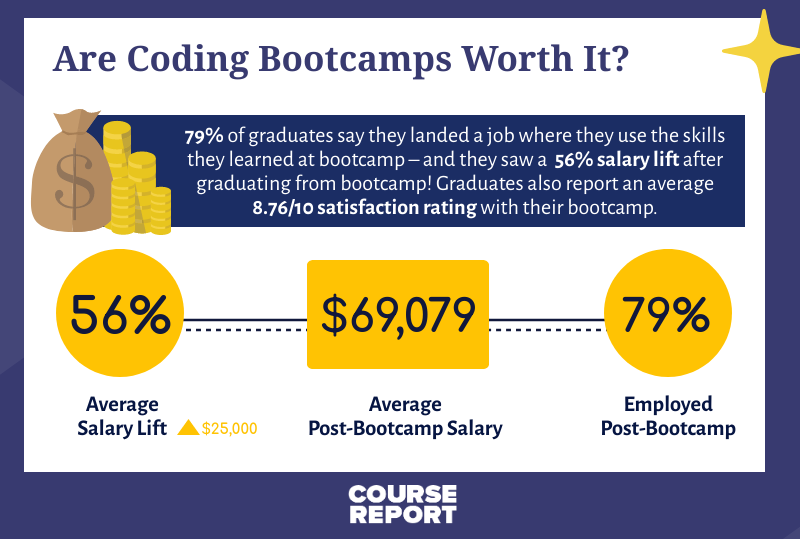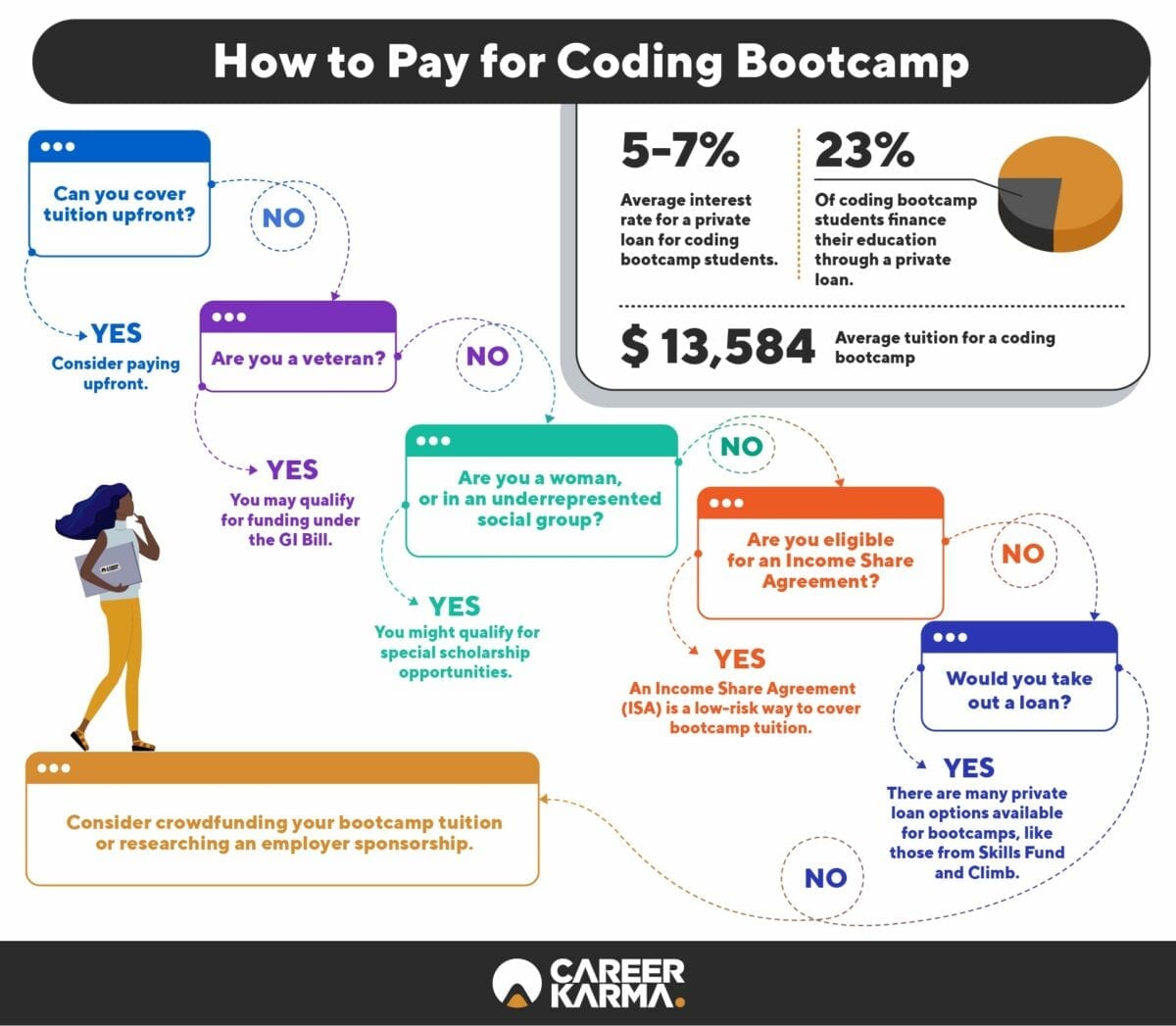Average Salaries After Bootcamp Completion: How Much Can You Make After Coding Bootcamp

Graduating from a coding bootcamp is a significant step towards a career in software development. However, understanding the potential salary range is crucial for realistic career planning. While individual earnings vary greatly, analyzing average salaries provides valuable insight into potential earning power.
Average salaries after bootcamp completion are influenced by a multitude of factors, making it challenging to provide a single definitive number. This section will explore these factors and provide a clearer picture of salary expectations.
Average Bootcamp Graduate Salaries by Programming Language and Location
The following table presents estimated average salaries for bootcamp graduates in various programming languages and locations. These figures are approximations based on industry reports and should be considered as ranges rather than precise values. Actual salaries will vary depending on factors discussed below.
| Programming Language | Location (Example) | Average Salary (USD) | Salary Range (USD) |
|---|---|---|---|
| Python | San Francisco, CA | 80,000 | 70,000 – 95,000 |
| JavaScript | New York, NY | 75,000 | 65,000 – 85,000 |
| Java | Austin, TX | 70,000 | 60,000 – 80,000 |
| Python | Denver, CO | 65,000 | 55,000 – 75,000 |
| JavaScript | Chicago, IL | 68,000 | 58,000 – 78,000 |
| Java | Seattle, WA | 85,000 | 75,000 – 95,000 |
Factors Influencing Salary Variations
Several key factors contribute to the significant variation in salaries observed among bootcamp graduates. Understanding these factors is essential for managing expectations and optimizing career trajectory.
Location plays a dominant role. High-cost areas like San Francisco, New York, and Seattle generally offer higher salaries due to increased demand and higher cost of living. Conversely, locations with a lower cost of living may offer lower average salaries, although the overall cost of living may offset the difference.
Experience level is another critical factor. Junior developers fresh out of bootcamp typically earn less than those with prior experience in related fields, even if that experience is not directly in software development. Experience in areas such as project management or data analysis can translate to higher initial salaries.
Specific job roles also influence salary. A full-stack developer with experience in both front-end and back-end development will typically command a higher salary than a front-end or back-end developer specializing in a single area. Similarly, roles requiring specialized skills, such as machine learning or cybersecurity, often come with higher compensation packages.
Salary Expectations for Junior-Level Developers Versus Experienced Professionals
Junior-level developers, typically those with less than two years of experience, often start at lower salaries than more experienced developers. Their salaries are heavily influenced by the factors mentioned above. For example, a junior developer in a high-cost area with in-demand skills might earn a higher salary than a similarly skilled junior developer in a lower-cost area. However, the salary gap between junior and senior developers is often substantial. A senior developer with extensive experience and proven expertise can earn significantly more, sometimes double or even triple the salary of a junior-level counterpart. Prior experience in a related field, such as IT support or data entry, can help bridge this gap, allowing graduates to start at a higher salary level. For instance, a bootcamp graduate with five years of experience in IT support might start at a higher salary than a graduate with no prior experience.
Income Potential Based on Specialization

Choosing a specialization after a coding bootcamp significantly impacts your earning potential. The demand for specific skill sets fluctuates, and certain niche areas command higher salaries than more generalist roles. Understanding these variations is crucial for career planning and maximizing your return on investment in bootcamp training.
How much can you make after coding bootcamp – Specialization allows developers to develop deep expertise in a particular area, leading to higher earning potential. This is because companies are willing to pay a premium for individuals with specialized skills to solve specific business problems. Conversely, generalist roles, while offering broader experience, may not command the same high salaries as those with highly sought-after niche skills.
Salary Ranges by Specialization
The following chart illustrates the average annual salary ranges for several popular developer specializations. These figures are estimates based on industry reports and job postings, and actual salaries can vary based on experience, location, and company size. Remember that these are averages and individual experiences may differ.
Imagine a chart with three bars representing different specializations: Web Development, Data Science, and Mobile App Development. The Web Development bar might reach $80,000 – $120,000, the Data Science bar might be taller, reaching $90,000 – $150,000, and the Mobile App Development bar might be similar in height to Web Development, around $75,000 – $110,000. The exact heights and values would depend on the most up-to-date salary data available, but this visualization gives a general idea of the potential salary differences.
Front-End, Back-End, and Full-Stack Developer Salaries
Understanding the salary differences between front-end, back-end, and full-stack developers is important for choosing a career path. Each role requires a unique skillset and contributes differently to a software project.
- Front-End Developers: These developers focus on the user interface (UI) and user experience (UX) of a website or application. They typically earn between $70,000 and $110,000 annually, with experienced professionals commanding higher salaries.
- Back-End Developers: These developers work on the server-side logic and databases of an application. Their salary range is similar to front-end developers, often between $75,000 and $115,000 per year, influenced by experience and expertise.
- Full-Stack Developers: These developers possess skills in both front-end and back-end development. Their expertise in both areas often leads to higher earning potential, with salaries ranging from $85,000 to $130,000 annually, reflecting their broader skill set.
Higher Salaries in Niche Specializations
While generalist roles are valuable, certain niche specializations can significantly increase earning potential. These areas often involve highly specialized skills in demand by a limited number of companies.
For example, a developer specializing in Artificial Intelligence (AI) or Machine Learning (ML) within the Data Science field can command significantly higher salaries than a general data analyst. Similarly, expertise in cybersecurity or blockchain development often translates to higher compensation due to the high demand and critical nature of these skills. The specific salary depends on the level of expertise and experience, but it’s not uncommon to see salaries exceeding $150,000 for highly skilled individuals in these niche areas. These higher salaries reflect the critical role these specialists play in securing sensitive data and developing innovative technologies.
Impact of Bootcamp Type and Duration

The duration and type of coding bootcamp significantly influence the cost and, consequently, the return on investment (ROI) for graduates. A shorter, more intensive program might offer a quicker path to employment, but potentially at the expense of comprehensive skill development. Conversely, longer programs provide a deeper skillset but require a larger upfront investment of time and money. Understanding these trade-offs is crucial for prospective students.
The relationship between bootcamp duration, cost, and post-graduation salary is complex and varies depending on factors such as the specific curriculum, instructor expertise, career services offered, and the student’s individual learning capabilities and networking efforts. It’s not simply a case of longer = better, nor shorter = worse.
Bootcamp Duration and Graduate Salary Outcomes
The duration of a bootcamp directly impacts the depth of the curriculum and the potential starting salary. Shorter bootcamps focus on specific skills, leading to quicker job placement, while longer programs cover a broader range of topics and may lead to higher-paying roles in the long run.
- Example 1: A 12-week full-time web development bootcamp might result in an average starting salary of $65,000. This rapid immersion allows for quicker entry into the job market.
- Example 2: A 24-week full-stack development bootcamp, covering more advanced concepts, could lead to an average starting salary of $75,000 or higher. The additional time allows for greater specialization and mastery of more complex skills.
- Example 3: A part-time data science bootcamp spanning six months might yield an average starting salary of $60,000, reflecting a balance between work and learning. The longer duration, albeit spread out, allows for a deeper understanding of the subject matter.
Return on Investment (ROI) for Different Bootcamp Types
The ROI of a coding bootcamp is calculated by comparing the total cost (tuition, fees, living expenses) against the increase in earning potential after graduation. Intensive short-term bootcamps offer a faster ROI due to quicker job placement, but the potential long-term earning capacity might be lower compared to a longer, more comprehensive program. Longer programs, while having a delayed ROI, may lead to higher earning potential over the long term, offsetting the initial higher cost. Calculating a precise ROI requires individual financial projections and varies greatly depending on the specific bootcamp and individual circumstances.
For example, a $15,000 bootcamp resulting in a $10,000 annual salary increase would have a faster ROI than a $25,000 bootcamp resulting in a $15,000 annual salary increase. However, the latter offers a greater potential long-term return.
Average Cost and Starting Salary for Different Bootcamp Types
The following table summarizes the average cost and average starting salary for different bootcamp types. These figures are estimations based on industry averages and may vary significantly depending on location, specific program, and individual circumstances.
| Bootcamp Type | Average Cost (USD) | Average Duration | Average Starting Salary (USD) |
|---|---|---|---|
| Full-Time Intensive | $13,000 – $20,000 | 3-6 months | $65,000 – $80,000 |
| Part-Time | $8,000 – $15,000 | 6-12 months | $55,000 – $70,000 |
| Online Self-Paced | $5,000 – $12,000 | 3-12 months | $50,000 – $65,000 |
| Hybrid (Online & In-Person) | $10,000 – $18,000 | 4-9 months | $60,000 – $75,000 |
Job Market Trends and Demand
The demand for software developers remains robust, fueled by the ongoing digital transformation across various industries. While the specific technologies and skillsets in demand fluctuate, the overall need for skilled developers continues to outpace the supply, creating a favorable job market for bootcamp graduates. This high demand is further influenced by factors such as rapid technological advancements and the increasing reliance on software solutions in almost every sector.
The current job market demonstrates a strong preference for developers with practical, hands-on experience. Coding bootcamps, with their intensive, project-based curriculum, are effectively addressing this need by producing graduates equipped to contribute immediately to development teams. However, the competitiveness within the field necessitates continuous learning and adaptation to emerging technologies to maintain a strong market position.
Geographic Areas with High Demand and Salaries
Several geographic regions consistently showcase higher demand and salaries for software developers. Major tech hubs like Silicon Valley (California), Seattle (Washington), New York City (New York), Austin (Texas), and Boston (Massachusetts) consistently rank among the top locations. These areas attract significant investment in technology, fostering a vibrant ecosystem of startups and established tech companies. However, the cost of living in these regions often needs to be considered when evaluating overall compensation. Other areas with growing tech scenes, such as Denver (Colorado) and Raleigh-Durham (North Carolina), offer a compelling balance of high demand and potentially more affordable living costs.
Factors Affecting Demand for Specific Programming Languages or Specializations
The demand for developers with specific skills varies considerably depending on current market trends and technological advancements. Currently, languages like Python (particularly in data science and machine learning), JavaScript (web development), and Java (enterprise applications) remain highly sought after. Specializations in areas such as cybersecurity, cloud computing, and artificial intelligence also command premium salaries due to their critical roles in modern technological infrastructure. Conversely, demand for developers specializing in older or less widely adopted technologies may be comparatively lower. For example, while COBOL programmers are still needed to maintain legacy systems, the demand is far less than for developers skilled in cloud-based technologies. This dynamic landscape requires developers to continually update their skills to remain competitive and adapt to evolving industry needs. The emergence of new technologies and frameworks will continue to shape the demand for specific skills. For instance, the rise of Web3 technologies is already creating new opportunities for developers with expertise in blockchain and related areas.
Factors Affecting Post-Bootcamp Earning Potential
Successfully navigating the job market after a coding bootcamp and securing a high-paying role depends on a multitude of factors extending beyond simply completing the curriculum. While the skills acquired are crucial, a strategic approach to career development significantly impacts earning potential. This section explores key elements contributing to higher salaries post-bootcamp.
Several key factors influence your earning potential after completing a coding bootcamp. These range from the tangible, like the quality of your portfolio, to the intangible, such as your networking skills and personal brand. Understanding and proactively addressing these factors can dramatically improve your post-bootcamp job prospects and salary negotiations.
Portfolio Quality and Project Demonstrations
A strong portfolio showcasing diverse projects and skills is arguably the most impactful factor in securing high-paying roles. Employers are primarily interested in seeing practical application of learned skills. A portfolio filled with well-documented, complex, and creative projects demonstrates a higher level of competency and problem-solving ability, making you a more attractive candidate. For example, a portfolio showcasing a full-stack web application with a robust backend, intricate front-end design, and integration with a database will command more attention and potentially a higher salary offer than a portfolio containing only basic tutorials or simple projects. The complexity and originality of your projects directly correlate with perceived value and, subsequently, your earning potential.
The Importance of Networking and Personal Branding, How much can you make after coding bootcamp
Networking and building a strong personal brand are often overlooked but are critical for career success. Networking provides access to hidden job opportunities, mentorship, and valuable industry insights. A well-crafted personal brand, built through consistent online presence (e.g., LinkedIn profile, GitHub contributions, blog posts), showcases your expertise and professionalism, attracting recruiters and potential employers. For instance, a candidate with a strong online presence demonstrating consistent contributions to open-source projects and active engagement in relevant online communities is more likely to be noticed and recruited than someone with a minimal online footprint. Actively participating in hackathons, tech meetups, and online forums allows you to build your network and showcase your skills to potential employers and mentors.
Communication and Problem-Solving Skills in Salary Negotiations
Strong communication and problem-solving skills are not only crucial for coding roles but also significantly impact salary negotiations. Clearly articulating your skills, accomplishments, and value proposition during interviews and salary discussions demonstrates confidence and professionalism. Similarly, demonstrating strong analytical and problem-solving abilities throughout the interview process reinforces your suitability for the role and justifies a higher salary expectation. For example, a candidate who can effectively explain their technical choices, articulate the challenges they overcame in a project, and present solutions in a clear and concise manner will be better positioned to negotiate a higher salary. The ability to effectively communicate your worth and justify your salary expectations is a key differentiator in securing a favorable compensation package.


Tim Redaksi